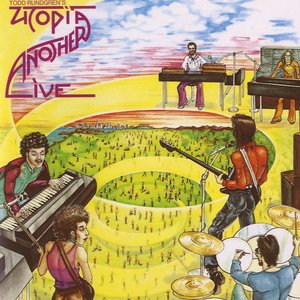Published on May 1, 1999
After reviewing
Todd Rundgren’s Utopia last year, declaring it “okay” and
living with the serious backlash I got (rightfully so, on further
review) from fans of Utopia and Todd Rundgren, I think I was a
little gunshy about tackling
Another Live, their 1975 release. For one thing, I hadn’t
heard the greatest things about it from some of the people I had
been in contact with. Second, I really didn’t want to spend my days
answering polite but firm flame mails letting me know that I was
completely wrong in my judgment.
I’ve spent (no joke) the better part of six months nursing this
album on the turntables of the Pierce Memorial Archives. And I
couldn’t believe my reaction. What would the people on
alt.music.todd-rundgren say when I admitted in my review that I –
gasp! – liked this album?
I’ve heard the horror stories about this album – the recording
of the show was poor, the performances were poor, “you’re gonna
hate this album”. Sorry, gang, but I didn’t hear a lot of
that in this record. There were a few moments I could have lived
without, but there weren’t a lot of them, and for the most part,
the album does a good job of capturing Utopia at a turning point in
their career.
After starting out life as a progressive rock outfit, you can
begin to hear cracks forming in their armor. Sure, there’s a lot of
progressive music on this record (“Another Life,” “The Seven
Rays”), but you also hear the project stating to merge with
Rundgren’s solo artist mindframe.
Exhibit “A”: “The Wheel,” a song which blew me away the first
time I heard it. It’s a jazzy acoustic track that locks into a
groove that refuses to let you go until its sudden, a capella
ending. The interplay between Rundgren’s guitar and vocals, John
Siegler’s bass, John Wilcox’s percussion and Roger Powell’s trumpet
is a thing of beauty that must be heard to be appreciated.
Exhibit “B”: Utopia’s cover of The Move’s “Do Ya,” a version
that is surprisingly close to the bone, and is a rollicking good
time. It’s not often I hear even the original version of this song,
so having Utopia’s take at my fingertips is a nice luxury.
Exhibit “C”: Even the progressive numbers, for the most part,
seem to have been toned down from just one album ago. (Note that
I’m not making the same mistake twice and suggesting that the
progressive angle is the wrong one.) If anything, the merging of
progressive with a pop sensibility seems to work better for Utopia,
even if it does water down the original intent of this musical
experiment.
Sure, I would have cut back on Powell’s keyboard solo on
“Intro/Mister Triscuits,” but everything did seem to fall into
place once the full band kicked in. And I guess it would be fair to
say that it does take a little time to get used to “Another Life,”
but after about three listens, it’s just as natural as
breathing.
So, the judgment is passed:
Another Live is a better album than many people give it
credit for… and probably better than some would have thought I
would have given it credit for. The line for the complaint
department forms to the left.
